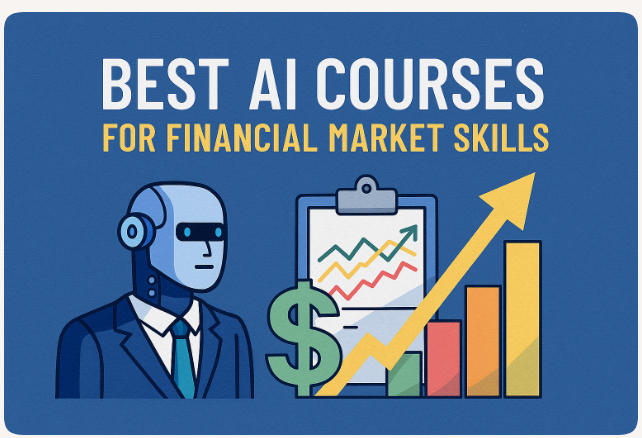Best AI Courses for Financial Market Skills are here, and understanding them is no longer optional, it’s a necessity. The top courses in 2025 integrate machine learning, algorithmic trading, and predictive analytics to provide professionals with state-of-the-art resources.
These programs are designed to help quants, traders, and finance executives streamline automated decision-making, predict future outcomes, and gain a competitive edge in the dynamic digital marketplace.
10 Best AI Courses for Financial Market Skills (2025)
| Course Name | Key Focus Areas |
|---|---|
| AI in Finance Certificate | Machine learning, portfolio optimization, risk models |
| AI for Business | AI strategy, NLP, automation in finance |
| AI in Risk Management | AI for credit, fraud, and market risk |
| AI in Financial Markets | Trading algorithms, robo-advisors, fintech AI |
| AI for Finance Leaders | Generative AI, forecasting, FP&A automation |
| AI in Investment Management | AI stock screening, sentiment analysis |
| AI & Machine Learning in Finance | Deep learning, financial modeling |
| AI for Algorithmic Trading | Python, ML models, backtesting strategies |
| AI in Wealth Management | AI advisory tools, client profiling |
| AI in Financial Forecasting | Predictive modeling, macroeconomic forecasting |
1. AI in Finance Certificate
This refers to structured certificate programmes that teach how AI is used across the functions of finance – trading, risk, forecasting, and operations. For instance, there is the “AI in Finance Specialisation” which includes 72+ expert-led videos and case studies designed for finance professionals. The goal is to provide you with a full breadth view.

What AI/ML models exist, how they fit into financial services, and what change management and governance issues might arise. By the end, you are awarded an industry-recognized certificate. It’s a great starting point if you’re looking for a wide, rather than a narrow, focus.
AI in Finance Certificate – Columbia University
Pros:
- An Ivy League institution with a reputation for being rigorous.
- Courses on ML, portfolio optimization, and risk modeling.
- Taught by faculty in both finance and data science.
- Heard of by foremost investment firms.
Cons:
- It’s less hands-on, with a greater emphasis on theory.
- Has a higher price point compared to other online courses.
- Less flexible structure (scheduled classes).
2. AI for Business
Courses on “AI for Business” examine how AI can transform and enhance operational excellence, strategy, and finance functions within a business.
For instance, the “AI for Business Leaders Course” discusses the intersection of AI technologies, strategies, and functions, along with the benefits to finance functions.

Even if the programmes are not directly about finance, they teach how to construct business cases for AI, assess the return on AI investments, strategic alignment, and create the governance framework for AI oversight.
For AI to transform finance, professionals need to implement it in budgeting, reporting, and decision-making, rather than focusing on developing trading models.
AI for Business – Wharton School
Pros:
- Strategic AI application through different facets of finance.
- Target audience being executives and higher management.
- Real-world NLP and automation integrated within case studies.
- Structured through Coursera.
Cons:
- Doesn’t fit the bill for developers.
- A sharp emphasis and content on trading or quantitative finance is lacking.
- Business is heavily focused on, rather than the market.
- For tech recruiters, the certification isn’t a showstopper.
3. AI in Risk Management
AI in Risk Management focuses on the application of AI/ML techniques for identification, modelling and mitigation of financial risks such as credit, market, operational and fraud risk.

For example, the course “AI for Finance Leaders: Risk Management & Forecasting” covers the use of AI in credit-risk models, stress-testing, and scenario analytics.
Students learn to construct predictive models, strategically lead the use of AI in risk frameworks, and embed governance and compliance which is critical in finance where high risk is invariably coupled with stringent regulatory requirements.
AI in Risk Management – NYIF
Pros:
- Specialization is risk management, fraud, credit, and market.
- Tools for the compliance teams to implement.
- Certification has value in the industry.
- Case studies from the real world.
Cons:
- Limited audience (not suitable for analysts or traders).
- Insufficient discussion on generative AI or deep learning.
- Excludes coding or ML model development.
- Might be less relevant for roles in fintech.
4. AI in Financial Markets
This section explains the use of AI in market-facing operations, including the analysis of market data, forecast price changes, identifies trends, and construct algorithmic strategies.
The courses titled “AI for Financial Markets” cover machine learning applications in asset pricing, time-series predictions, sentiment scrutiny, and market micro-structure.

As an example, more comprehensive certificate programmes have trading and algorithmic assessment modules integrated with them.
Such programmes suit those professionals who intend to engage in trading desks, quantitative research, or portfolio management, and not in operations only.
AI in Financial Markets – CFTE
Pros:
- Discusses AI bots, robo-advisors, and fintech instruments.
- Non-coders will find this course useful.
- Applications in real-world trading.
- Self paced and modular.
Cons:
- Limited academic focus.
- Coverage on advanced ML is lacking.
- Certification has little value in the job market.
- Possibly insufficient course rigor.
5. AI for Finance Leaders
These offerings are aimed at high-ranking finance practitioners (CFOs, finance directors, controllers) who steer strategic finances and digital transformation beyond AI.

One of the more popular offerings, “AI for Finance Leaders” features modules in data governance, predictive analytics, and AI-augmented finance teams.
The emphasis here is less on coding or model-building and more on assessing AI opportunities, championing AI use in the finance function, guarding its ethical use, and strategic business alignment of AI funds.
AI for Finance Leaders – Datarails Academy
Pros:
- Emphasis on forecasting and FP&A automation.
- Intended for finance teams and CFOs.
- Uses generative AI.
- Integrates with SaaS and BI tools, Excel.
Cons:
- Unsuitable for quants or traders.
- More focus on business operations than market analysis.
- Limited ML concepts and coding.
- Not designed for effective portfolio management.
6. AI in Investment Management
For AI in investment management, portfolio construction, and asset allocation, Robo-advisory, risk-return modeling and predictive analytics are all included. Investment and AI in investment management courses cover how machine learning and AI assist in fund management and automating decision processes.

An instance would be the “Artificial Intelligence for Investments” course where AI and machine learning in asset management are discussed. This is appropriate for asset management, hedge fund and advisory professionals who seek AI competencies to enhance investment performance.
AI in Investment Management – Udemy
Pros:
- Beginner friendly and inexpensive.
- Includes stock screening and sentiment analysis.
- Offers a degree of flexibility with self-paced learning.
- Target audience is retail investors.
Cons:
- Instruction quality is inconsistent.
- Absence of peer-reviewed material.
- Limited ML or finance theory.
- No institutional certification is provided.
7. AI & Machine Learning in Finance
In this area, the focus is purely technical and revolves around algorithms and their applications in various areas of finance like trading, forecasting, portfolio optimization, and the algorithms problem of fraud detection.

An instance would be the certification course called “AI and Machine Learning in Finance” which focuses on algorithmic price prediction, risk modeling, trend analysis and other related areas. This would fit quant analysts and finance data scientists who have some background in programming and statistics.
AI & Machine Learning in Finance – LSE
Pros:
- Focus on deep learning and financial modeling.
- Strong focus on academia.
- Best suited for learners at the graduate level.
- Covers time-series and neural networks.
Cons:
- Assumes knowledge of ML and finance.
- Greater difficulty in practical utilization for immediate trading.
- More expensive and time-consuming.
- Possible absence of real-time data.
8. AI for Algorithmic Trading
This area involves using AI/ML tools for the creation of algorithmic trading strategies: building and testing models, making real-time high-frequency trading decisions, and automating order execution.

For instance, the course “GenAI for Algorithmic Trading” teaches how to use generative AI techniques to create trading strategies. Participants will analyze historical market data and utilize coding and back-testing frameworks to deploy AI-driven signals.
This course is directed at technically minded finance professionals who work in trading or quantitative roles, and not in finance operations more broadly.
AI for Algorithmic Trading – QuantInsti
Pros:
- Opportunity for practical Python coding and backtesting.
- Provides information for algo traders and developers.
- Discussion on ML models for execution.
- Offers strategy deployment tools.
Cons:
- Advanced programming skills required.
- Not for beginners.
- More focused on trading than finance operations.
- Limited business strategy information.
9. AI in Wealth Management
Wealth management is about providing counsel to people and families, and includes the strategies of asset allocation, and construction of bespoke portfolios. AI assists this function through the automation of service delivery with robo-advisors, client profiling, risk assessment, and decision support systems.

The course “Artificial Intelligence in Wealth Management” teaches how AI/ML technologies function in financial advisory, wealth planning, and client service. If you are in private client advisory, wealth tech, or HNW services, this course will help you retool to technology-assisted advice.
AI in Wealth Management – Wall Street Prep
Pros:
- Focus on automation of client advisory and client profiling.
- Practical tools for aspiring fintech founders.
- Personalization AI with CRM.
- Excellent for B2C wealth management platforms.
Cons:
- Limited trading or portfolio theory.
- More focus on sales/advisory than analytics.
- Not suited for institutional finance.
- Possible lack of depth in the subject.
10. AI in Financial Forecasting
Within the finance discipline, the ability to envision the future state of various domains – cash flows, revenue, budgets, markets, and even macro-economics – is invaluable. AI improves the precision of predictions by leveraging time-series models, deep learning, and various other methods such as anomaly detection.

The course “GenAI for Financial Forecasting and Planning” offered on Coursera explains the automation of forecasting for finance professionals using generative AI and predictive tools, along with other enhancements to forecasting.
For finance departments in FP&A, treasury, and market analysts, the importance of this shift cannot be overstated as it moves finance teams from just reporting on the past to engaging in proactive scenario planning.
AI in Financial Forecasting – Complete AI Training
Pros:
- Focus on macroeconomic prediction.
- Targeted at planners and economists.
- Time-series and regression are covered.
- Comes with predictive analytics dashboards.
Cons:
- More applicable for long-term investors.
- Possibly missing API/data stream connectivity.
- Doesn’t emphasize portfolio optimization.
- Minimal focus on generative AI.
Conclusion
In 2025, the top AI courses focusing on the financial market equip individuals with the skills needed in predictive analytics, algorithmic trading, and decision-making. Columbia’s AI in Finance program and QuantInsti’s Algorithmic Trading focus on hands-on training for quants and developers, while AI-powered automation for finance executives is the focus at Wharton and Datarails.
These courses provide a combination of academic and real-world training for a variety of tasks, whether it is portfolio optimization, macro trend forecasting, or fintech tool development. They cover almost every aspect of finance that utilizes AI, from robo-advising down to risk management. Select based on your desired market specialization, role, and coding proficiency.
FAQ
Which AI course is best for algorithmic trading?
The top choice is QuantInsti’s AI for Algorithmic Trading, offering hands-on Python coding, ML strategy development, and backtesting tools.
Are these courses suitable for beginners?
Yes—courses like Udemy’s AI in Investment Management and CFTE’s AI in Financial Markets are beginner-friendly and don’t require coding experience.
Do I need a finance background to enroll?
Not always. Some courses like Wharton’s AI for Business and Datarails Academy focus on strategic AI applications and are accessible to non-finance professionals.
Which course is best for risk management?
NYIF’s AI in Risk Management is ideal for compliance teams and risk officers, covering fraud detection, credit scoring, and market risk.
What’s the most academic course available?
Columbia University’s AI in Finance Certificate and LSE’s AI & Machine Learning in Finance offer rigorous, institution-grade training with deep theoretical foundations.









